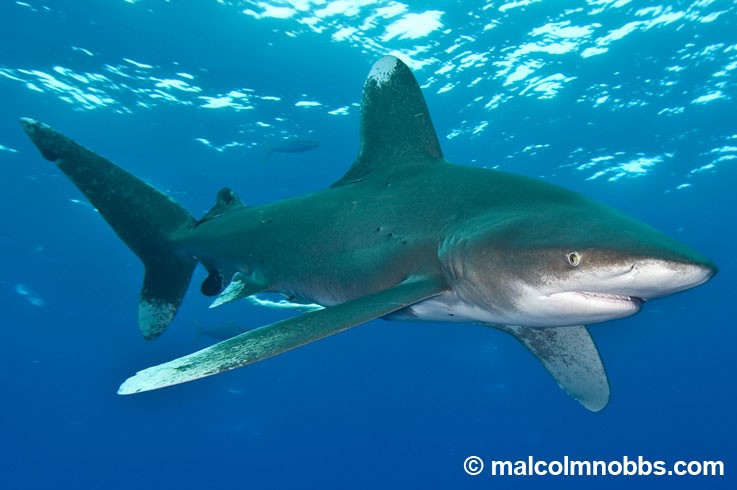Oceanic Whitetips: Swimming Into the History Pages?

Oceanic whitetip sharks and hawksbill turtles appear to have little in common, but sadly they share a similar fate - both are highly valued for just one of their body parts, while the rest of the animal is usually discarded.
Hawksbill turtle shells are used for jewellery and souvenirs, while the oceanic whitetip's long, curved fins are highly prized for shark fin soup. In both cases the flesh is less valuable and often discarded, though whitetip shark meat is consumed in some regions.
Oceanic whitips Carcharhinus longimanus were once widespread and abundant in a wide band of tropical and subtropical water circling the globe. But in just a few generations fishing has greatly reduced their numbers causing the International Union for the Conservation of Nature (IUCN) to list them as Vulnerable globally and Critically Endangered in northwest and western central Atlantic.
Oceanic whitetips are mainly caught as bycatch in fisheries that target tuna and swordfish. Typically still alive when landed, they would likely survive if immediately returned to the water. But the high value of their fins and the low value of their meat encourages finning - the cruel and wasteful practice of removing a sharks fins and dumping the body overboard.
Oceanic whitetips are open ocean sharks; slowly cruising the high seas down to around 150 metres looking for feeding opportunities. They are solid, powerful sharks growing to around three meters. You can identify an Oceanic whitetip by their long pectoral fins with white tips to most of their fins.
The IUCN warns that the global population of oceanic whitetips is decreasing, and that international agreements and improved data collection are required to properly conserve and manage this majestic shark.
Project AWARE is working hard to have oceanic whitetips protected under the Convention on International Trade in Endangered Species (CITES) at the March 2013 meeting in Thailand. An Appendix II CITES listing would control international trade and start their long journey back from the brink of extinction.
Let's not allow oceanic whitetips to swim into the history pages. Take action for sharks and support Project AWARE's work to protect them under CITES.



